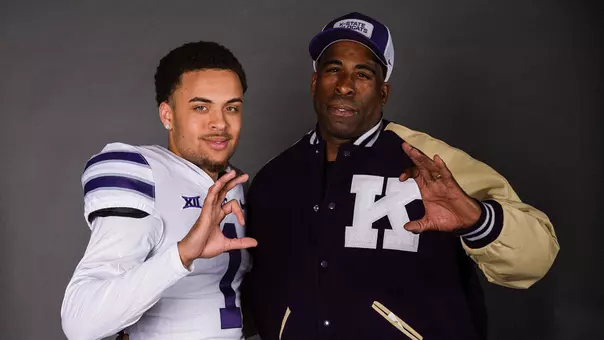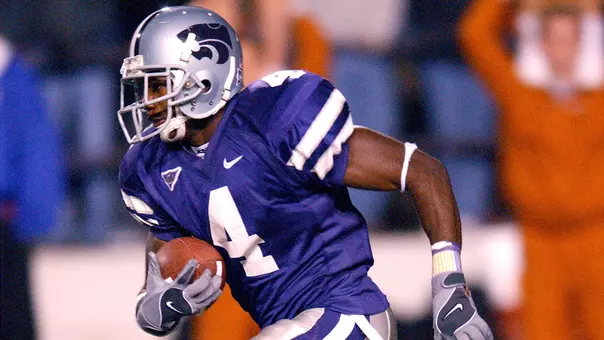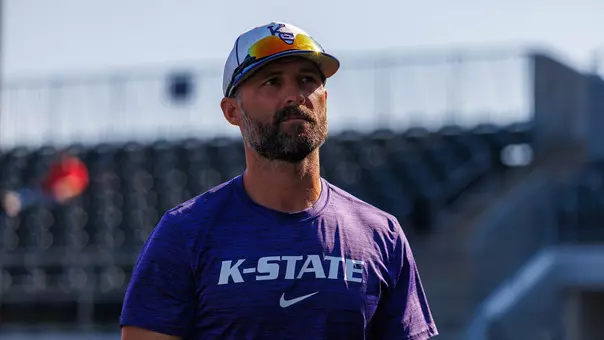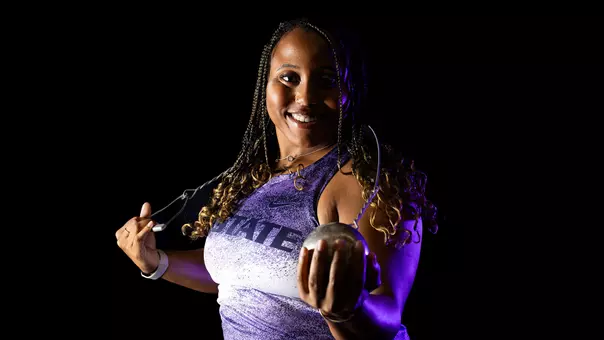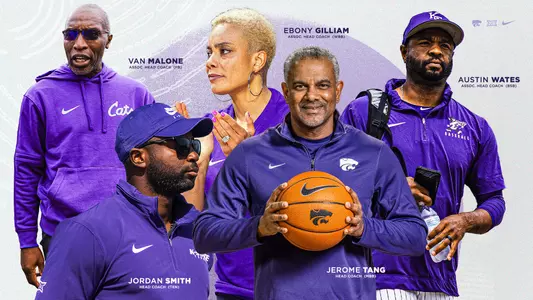
Making a Difference
Feb 04, 2025 | Sports Extra, Athletics
By: D. Scott Fritchen
February is Black History Month, and the first Tuesday of February is an occasion to celebrate National African American Coaches Day. Kansas State Athletics recognizes all African American coaches who mentor and make a difference in the lives of young people.
K-State Sports Extra's D. Scott Fritchen spoke with five K-State coaches, associate head coaches and assistant coaches about a variety of topics related to the special day.
The list of interviewees includes:
How special is National African American Coaches Day to you?
VAN MALONE: I consider it more special to be a coach. I'm a coach who happens to be African American. When you think about a day that honors coaches who do what they do who happen to be African American, I think that's a cool deal.
AUSTIN WATES: I think it's pretty cool that we get a little bit of representation as a minority class, and it's important that we acknowledge that. There's not a ton of us in this sport in particular, so it's pretty cool.
JORDAN SMITH: I was watching the championship with (Notre Dame head football coach) Marcus Freeman, and I really enjoyed what he said: "Yeah, it's special that I can be in position to hopefully represent a group of people who are trying to something really powerful and impact other people, but I also want to make sure that we know that everything we do is for each other and we're all together in everything." It's kind of that mindset for me.
EBONY GILLIAM: It just says a lot about where the game is going and where our country is going just to have a day recognized. It's pretty special. You think about coaches, things are changing, and they're changing better for our game with women and with African Americans being hired in women's basketball.
JEROME TANG: First of all, I didn't even know it's a day, but I'm thankful that it is a day because we're recognizing that there was a struggle for this day to even be represented. Some of my heroes growing up — Coach John Thompson, Coach John Chaney, Coach Tubby Smith, Coach Nolan Richardson — held that position that allowed me to believe that one day I could do it also.

Framing this in the context of Kansas State Athletics, what is it like being an African American coach at Kansas State University?
VAN MALONE: Kansas State has preached diversity over the years and has practiced that. For me, the place I work and the people I work with, they understand there's strength in diversity and in including everybody. People talk about attitudes, but to me I believe your actions are what's most important. You can legislate people's hearts, but what I see as an African American coach at Kansas State is a program, a university, a community that embraces inclusion and diversity. There's strength in diversity.
AUSTIN WATES: It's an honor. I always say we want to acknowledge that stuff and do a really good job representing for African Americans everywhere but more importantly just for the athletic department that we represent.
JORDAN SMITH: I'm just so happy that being here I know that it was for being Jordan Smith and not everything else, but at the same time, I was just so supported, and people wanted to hear my story, my background, because it's pretty noticeable. The K-State community just took time to learn and hear and listen. Obviously, when you have somebody like (legendary K-State head baseball coach) Coach Dave Baker, who was the first (African American baseball coach in the Big Seven, Big Eight and Big 12), and who paved the way, this was normal, and it was something we want for our community, and K-State has always shown up and showed that. This community has been pretty special for all our families to grow and be supported. There's no bigger pride than knowing you're going to be comfortable, and K-State has done that for us.

EBONY GILLIAM: You know what? It's been a very pleasant experience for me. I'm from DFW in Texas so moving to Kansas, I was a little bit nervous because there's already a climate change to begin with, so just being from the city and moving to a smaller town was very different for me, but what I like about Manhattan and love about living here is there's Fort Riley and I see different walks of people just because of the military base alone, and with this being a college town, you see all different types of people. Manhattan is just a very welcoming place. I've never felt out of place here. I've felt like I belong. This has been a great fit for me and my family.
JEROME TANG: Being a minority coach at any university on this type of platform is a tremendous honor and responsibility. Our success and how we handle ourselves can create other opportunities for others. Dave Baker, who I've gotten to know, and I consider him a friend and also a mentor, because of the way he handled himself as a baseball coach here, it opened doors here for me to have this chance. It's a great responsibility, not just for me and my family to win games, and to the university, but also to any other minority coach that's going to follow the opportunity could exist for them because of the success that I have.
What progress have you seen in African Americans collectively in the coaching world and what more work needs to be done?
VAN MALONE: There's definitely been progress when you think about the fact that Marcus Freeman played for the national championship. That would've been an impossibility 30 years ago, so there has been progress, but when you think of the odds that Marcus Freeman had to overcome to reach that pinnacle of the national championship, and the so few numbers of African American coaches leading programs as compared to the overall number, when you connect it you have to connect it to the players that play on the field. There has been progress, but we still have a long way to go. The fact that we have a long way to go, I don't think that separates people. The fact that we're on the 3-yard line and we're trying to get to the goal line, that's a good thing to understand and a good thing to talk through and figure out how we are going to make progress and move these chains faster. In 30 years, they have moved but it's just the rate of progress that frustrates many people.
AUSTIN WATES: I think we've just seen a lot more people of color get opportunities in high-level positions. I think 20-40 years ago that wasn't happening as often. Anytime you can give people a chance you're going to get some really high-level coaches. In any field you're going to get high-level people who may not have gotten an opportunity years ago. That's always important.

JORDAN SMITH: You look at your bigger sports and there's more variety with age, background or race, and that's really powerful to see. You never know who's going to be a player, a coach or a manager. I think sometimes in the smaller sports that are still labeled as "country club" or things of that nature, when you see more diverse backgrounds there, it can maybe inspire some to think outside of certain sports. Everyone is talented in their own way, but if you're only talented for certain sports, you get pigeonholed. So, the more doors we can open saying, "Hey, you can try this sport because this person created the path," and you can see young kids really excel. That's what happened with me. I love basketball, but I'm not a basketball player. I'm thankful I had the opportunity to venture out and play other sports. Luckily, I was able to find one that helped me to be successful: Tennis.
I try not to get too big in the stats, but somebody did bring it up to me that when I was hired by Gene Taylor, I was the third Power 5 head coach in women's tennis, and fourth overall, so that was crazy to think there were only four African American coaches. That was in 2018. That's not too long ago. We're still not in double digits. There's a long way to go. Thankfully, we've had some really successful tennis players with Venus and Serena, and women's tennis has diversity, but with the guys it's still a little tougher, because most guys want to play basketball or football. Tennis can be cool, too, and fun. Having less than 10 out of 70 Power 4 schools, we can do better.
EBONY GILLIAM: I think it's like anything else, in my profession it's progressing, and I think you're seeing a lot more African Americans hired whether male or female, mostly female for female sports, and in our sport that what's we're really promoting, for more females to be hired, but specifically for African Americans. I feel there are schools actively seeking it out. I don't feel like it was like that years ago like when I was a young player. I felt like women's basketball, in particular, looked a certain way. Head coaches right now are hiring more African Americans as assistant coaches and promoting like myself to associate head coach. That's the biggest part of it right now and molding African Americans to get to that next level and become head coaches. I think that's the biggest change I've seen. There's more diversity among the staffs.

JEROME TANG: The numbers say that there hasn't been progress. There's still some Power conferences in the country that don't have minority head coaches, whether in football or in basketball. That's disappointing. The numbers in the NFL have gone down, and the numbers in the NBA. So, the numbers say that progress really hasn't been made like it should, so hopefully we, myself and others, can do some things success-wise. All universities want to win. It's a business and they want to be successful, so it's up to us to have the kind of success that makes athletic directors and presidents on other campuses say they want to give this other person an opportunity.
What advice do you give to young African American coaches?
VAN MALONE: I'm always in a position to help young African American coaches with my roles with the AFCA as the Chairman of Minority Advancement Committee. It's one of the things that I do with some of the activities we have at the coaches' convention is to advice coaches. The thing that we say to coaches, not just African-American, is that you have to be the best you can be where you are. I give that advice to myself wanting to be a head coach. I'm working to be the best assistant coach that I can be. You have to understand your product has to be a good product on the field and off the field because you have to understand, especially in situations where in some position groups those players look just like you, so you have to do a good job of developing your players on and off the field. You also have to continually expand your network outside your circle. That's diversity, right? There's strength in diversity. I encourage them to have a diverse network, a network of coaches who don't look like you, who are close to your age, who are younger and older than you might be in terms of your career and in terms of their experience in the career that we're in.
The final thing that I say is you can't get discouraged with the progress. People, especially people that I've been around in this profession, they are in many ways slow to change, but once you get them going in that direction, they go 100 miles-per-hour. So, I try to encourage young African American coaches to be patient with the progress but don't ever stop pushing for progress and change and growth – not just in yourself but in people around you. African American coaches are frustrated because they get labeled or put in a box, and what I encourage them to do is to continually fight against that and to continually fight to be the best you can be in all areas of your coaching responsibility.

AUSTIN WATES: I think just to keep working and to build your network. I think in any business, people can appreciate regardless of color people who work extremely hard. It might not happen right away, but if you work hard and are able to grow your network and reach out and talk to as many people as you can, that will help you in the long run. And then once you start to form those relationships, opportunities should come your way if you put all of that together. I don't think you can just work hard and expect everything to work out, and I don't think you can just network and expect everything to work out. You have to hit every phase of that.
EBONY GILLIAM: I know our sport is made up of different walks of people, but I think just being a representation of an African American in this sport and for a lot of those African Americans that play the sport, there are a lot of black females in our games that play basketball. For them to see that I'm a black woman, married with kids, and I'm coaching, and I want to be a head coach, just being an example and showing those players that aspire to do that one day this is possible, and this is a field you can excel in if this is what you want to do.
JEROME TANG: It'd be the same advice I'd give any coach. Be a star wherever you're at. Whatever role you're given, be the best you can be, and bloom where you're planted. A lot of coaches are always thinking about the next job or the next thing, and the way to get to the next thing is to be a star right where you're at. If you're a star where you're at, they'll come find you. And don't let the fact that whatever minority category you fall into, it's not an obstacle. Diversity is strength. Don't treat it as an obstacle or see it as an obstacle. See it as a strength that you provide something that somebody else can't from a different point of view.
February is Black History Month, and the first Tuesday of February is an occasion to celebrate National African American Coaches Day. Kansas State Athletics recognizes all African American coaches who mentor and make a difference in the lives of young people.
K-State Sports Extra's D. Scott Fritchen spoke with five K-State coaches, associate head coaches and assistant coaches about a variety of topics related to the special day.
The list of interviewees includes:
- Van Malone, assistant head coach, K-State football
- Austin Wates, associate head coach, K-State baseball
- Jordan Smith, head coach, K-State women's tennis
- Ebony Gilliam, associate head coach, K-State women's basketball
- Jerome Tang, head coach, K-State men's basketball
How special is National African American Coaches Day to you?
VAN MALONE: I consider it more special to be a coach. I'm a coach who happens to be African American. When you think about a day that honors coaches who do what they do who happen to be African American, I think that's a cool deal.
AUSTIN WATES: I think it's pretty cool that we get a little bit of representation as a minority class, and it's important that we acknowledge that. There's not a ton of us in this sport in particular, so it's pretty cool.
JORDAN SMITH: I was watching the championship with (Notre Dame head football coach) Marcus Freeman, and I really enjoyed what he said: "Yeah, it's special that I can be in position to hopefully represent a group of people who are trying to something really powerful and impact other people, but I also want to make sure that we know that everything we do is for each other and we're all together in everything." It's kind of that mindset for me.
EBONY GILLIAM: It just says a lot about where the game is going and where our country is going just to have a day recognized. It's pretty special. You think about coaches, things are changing, and they're changing better for our game with women and with African Americans being hired in women's basketball.
JEROME TANG: First of all, I didn't even know it's a day, but I'm thankful that it is a day because we're recognizing that there was a struggle for this day to even be represented. Some of my heroes growing up — Coach John Thompson, Coach John Chaney, Coach Tubby Smith, Coach Nolan Richardson — held that position that allowed me to believe that one day I could do it also.

Framing this in the context of Kansas State Athletics, what is it like being an African American coach at Kansas State University?
VAN MALONE: Kansas State has preached diversity over the years and has practiced that. For me, the place I work and the people I work with, they understand there's strength in diversity and in including everybody. People talk about attitudes, but to me I believe your actions are what's most important. You can legislate people's hearts, but what I see as an African American coach at Kansas State is a program, a university, a community that embraces inclusion and diversity. There's strength in diversity.
AUSTIN WATES: It's an honor. I always say we want to acknowledge that stuff and do a really good job representing for African Americans everywhere but more importantly just for the athletic department that we represent.
JORDAN SMITH: I'm just so happy that being here I know that it was for being Jordan Smith and not everything else, but at the same time, I was just so supported, and people wanted to hear my story, my background, because it's pretty noticeable. The K-State community just took time to learn and hear and listen. Obviously, when you have somebody like (legendary K-State head baseball coach) Coach Dave Baker, who was the first (African American baseball coach in the Big Seven, Big Eight and Big 12), and who paved the way, this was normal, and it was something we want for our community, and K-State has always shown up and showed that. This community has been pretty special for all our families to grow and be supported. There's no bigger pride than knowing you're going to be comfortable, and K-State has done that for us.

EBONY GILLIAM: You know what? It's been a very pleasant experience for me. I'm from DFW in Texas so moving to Kansas, I was a little bit nervous because there's already a climate change to begin with, so just being from the city and moving to a smaller town was very different for me, but what I like about Manhattan and love about living here is there's Fort Riley and I see different walks of people just because of the military base alone, and with this being a college town, you see all different types of people. Manhattan is just a very welcoming place. I've never felt out of place here. I've felt like I belong. This has been a great fit for me and my family.
JEROME TANG: Being a minority coach at any university on this type of platform is a tremendous honor and responsibility. Our success and how we handle ourselves can create other opportunities for others. Dave Baker, who I've gotten to know, and I consider him a friend and also a mentor, because of the way he handled himself as a baseball coach here, it opened doors here for me to have this chance. It's a great responsibility, not just for me and my family to win games, and to the university, but also to any other minority coach that's going to follow the opportunity could exist for them because of the success that I have.
What progress have you seen in African Americans collectively in the coaching world and what more work needs to be done?
VAN MALONE: There's definitely been progress when you think about the fact that Marcus Freeman played for the national championship. That would've been an impossibility 30 years ago, so there has been progress, but when you think of the odds that Marcus Freeman had to overcome to reach that pinnacle of the national championship, and the so few numbers of African American coaches leading programs as compared to the overall number, when you connect it you have to connect it to the players that play on the field. There has been progress, but we still have a long way to go. The fact that we have a long way to go, I don't think that separates people. The fact that we're on the 3-yard line and we're trying to get to the goal line, that's a good thing to understand and a good thing to talk through and figure out how we are going to make progress and move these chains faster. In 30 years, they have moved but it's just the rate of progress that frustrates many people.
AUSTIN WATES: I think we've just seen a lot more people of color get opportunities in high-level positions. I think 20-40 years ago that wasn't happening as often. Anytime you can give people a chance you're going to get some really high-level coaches. In any field you're going to get high-level people who may not have gotten an opportunity years ago. That's always important.

JORDAN SMITH: You look at your bigger sports and there's more variety with age, background or race, and that's really powerful to see. You never know who's going to be a player, a coach or a manager. I think sometimes in the smaller sports that are still labeled as "country club" or things of that nature, when you see more diverse backgrounds there, it can maybe inspire some to think outside of certain sports. Everyone is talented in their own way, but if you're only talented for certain sports, you get pigeonholed. So, the more doors we can open saying, "Hey, you can try this sport because this person created the path," and you can see young kids really excel. That's what happened with me. I love basketball, but I'm not a basketball player. I'm thankful I had the opportunity to venture out and play other sports. Luckily, I was able to find one that helped me to be successful: Tennis.
I try not to get too big in the stats, but somebody did bring it up to me that when I was hired by Gene Taylor, I was the third Power 5 head coach in women's tennis, and fourth overall, so that was crazy to think there were only four African American coaches. That was in 2018. That's not too long ago. We're still not in double digits. There's a long way to go. Thankfully, we've had some really successful tennis players with Venus and Serena, and women's tennis has diversity, but with the guys it's still a little tougher, because most guys want to play basketball or football. Tennis can be cool, too, and fun. Having less than 10 out of 70 Power 4 schools, we can do better.
EBONY GILLIAM: I think it's like anything else, in my profession it's progressing, and I think you're seeing a lot more African Americans hired whether male or female, mostly female for female sports, and in our sport that what's we're really promoting, for more females to be hired, but specifically for African Americans. I feel there are schools actively seeking it out. I don't feel like it was like that years ago like when I was a young player. I felt like women's basketball, in particular, looked a certain way. Head coaches right now are hiring more African Americans as assistant coaches and promoting like myself to associate head coach. That's the biggest part of it right now and molding African Americans to get to that next level and become head coaches. I think that's the biggest change I've seen. There's more diversity among the staffs.

JEROME TANG: The numbers say that there hasn't been progress. There's still some Power conferences in the country that don't have minority head coaches, whether in football or in basketball. That's disappointing. The numbers in the NFL have gone down, and the numbers in the NBA. So, the numbers say that progress really hasn't been made like it should, so hopefully we, myself and others, can do some things success-wise. All universities want to win. It's a business and they want to be successful, so it's up to us to have the kind of success that makes athletic directors and presidents on other campuses say they want to give this other person an opportunity.
What advice do you give to young African American coaches?
VAN MALONE: I'm always in a position to help young African American coaches with my roles with the AFCA as the Chairman of Minority Advancement Committee. It's one of the things that I do with some of the activities we have at the coaches' convention is to advice coaches. The thing that we say to coaches, not just African-American, is that you have to be the best you can be where you are. I give that advice to myself wanting to be a head coach. I'm working to be the best assistant coach that I can be. You have to understand your product has to be a good product on the field and off the field because you have to understand, especially in situations where in some position groups those players look just like you, so you have to do a good job of developing your players on and off the field. You also have to continually expand your network outside your circle. That's diversity, right? There's strength in diversity. I encourage them to have a diverse network, a network of coaches who don't look like you, who are close to your age, who are younger and older than you might be in terms of your career and in terms of their experience in the career that we're in.
The final thing that I say is you can't get discouraged with the progress. People, especially people that I've been around in this profession, they are in many ways slow to change, but once you get them going in that direction, they go 100 miles-per-hour. So, I try to encourage young African American coaches to be patient with the progress but don't ever stop pushing for progress and change and growth – not just in yourself but in people around you. African American coaches are frustrated because they get labeled or put in a box, and what I encourage them to do is to continually fight against that and to continually fight to be the best you can be in all areas of your coaching responsibility.

AUSTIN WATES: I think just to keep working and to build your network. I think in any business, people can appreciate regardless of color people who work extremely hard. It might not happen right away, but if you work hard and are able to grow your network and reach out and talk to as many people as you can, that will help you in the long run. And then once you start to form those relationships, opportunities should come your way if you put all of that together. I don't think you can just work hard and expect everything to work out, and I don't think you can just network and expect everything to work out. You have to hit every phase of that.
EBONY GILLIAM: I know our sport is made up of different walks of people, but I think just being a representation of an African American in this sport and for a lot of those African Americans that play the sport, there are a lot of black females in our games that play basketball. For them to see that I'm a black woman, married with kids, and I'm coaching, and I want to be a head coach, just being an example and showing those players that aspire to do that one day this is possible, and this is a field you can excel in if this is what you want to do.
JEROME TANG: It'd be the same advice I'd give any coach. Be a star wherever you're at. Whatever role you're given, be the best you can be, and bloom where you're planted. A lot of coaches are always thinking about the next job or the next thing, and the way to get to the next thing is to be a star right where you're at. If you're a star where you're at, they'll come find you. And don't let the fact that whatever minority category you fall into, it's not an obstacle. Diversity is strength. Don't treat it as an obstacle or see it as an obstacle. See it as a strength that you provide something that somebody else can't from a different point of view.
K-State Men's Basketball | 2026 Dillons Sunflower Showdown Hype
Saturday, January 24
K-State Women's Basketball | Cinematic Highlights vs Houston
Saturday, January 24
K-State Men's Basketball | Creative Highlights vs Utah
Thursday, January 22
Men's Basketball | David Castillo Releases the Threes
Thursday, January 22
